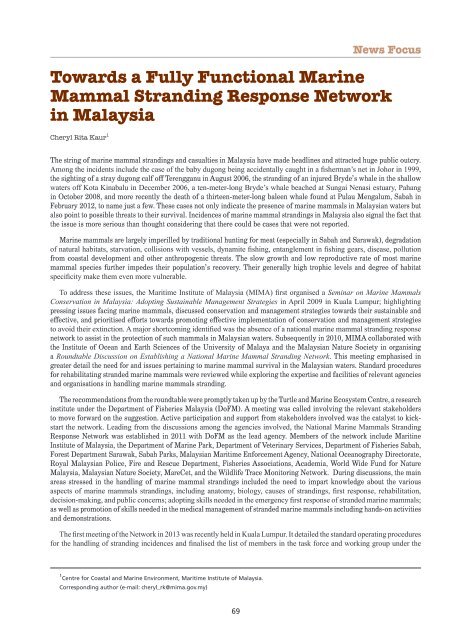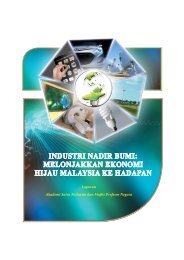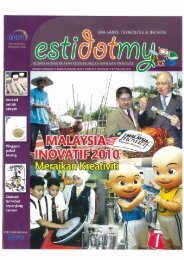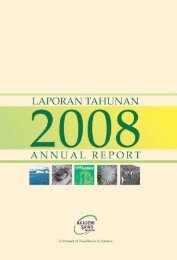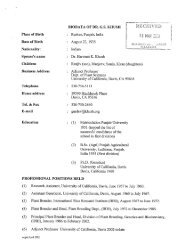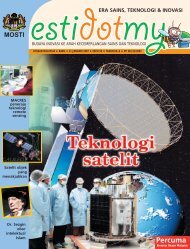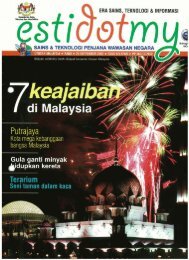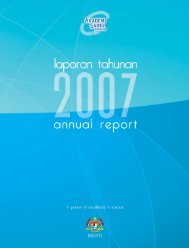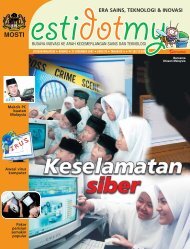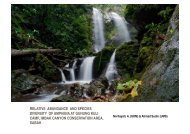Contents - Akademi Sains Malaysia
Contents - Akademi Sains Malaysia
Contents - Akademi Sains Malaysia
- No tags were found...
Create successful ePaper yourself
Turn your PDF publications into a flip-book with our unique Google optimized e-Paper software.
Towards a Fully Functional MarineMammal Stranding Response Networkin <strong>Malaysia</strong>Cheryl Rita Kaur 1News FocusThe string of marine mammal strandings and casualties in <strong>Malaysia</strong> have made headlines and attracted huge public outcry.Among the incidents include the case of the baby dugong being accidentally caught in a fisherman’s net in Johor in 1999,the sighting of a stray dugong calf off Terengganu in August 2006, the stranding of an injured Bryde’s whale in the shallowwaters off Kota Kinabalu in December 2006, a ten-meter-long Bryde’s whale beached at Sungai Nenasi estuary, Pahangin October 2008, and more recently the death of a thirteen-meter-long baleen whale found at Pulau Mengalum, Sabah inFebruary 2012, to name just a few. These cases not only indicate the presence of marine mammals in <strong>Malaysia</strong>n waters butalso point to possible threats to their survival. Incidences of marine mammal strandings in <strong>Malaysia</strong> also signal the fact thatthe issue is more serious than thought considering that there could be cases that were not reported.Marine mammals are largely imperilled by traditional hunting for meat (especially in Sabah and Sarawak), degradationof natural habitats, starvation, collisions with vessels, dynamite fishing, entanglement in fishing gears, disease, pollutionfrom coastal development and other anthropogenic threats. The slow growth and low reproductive rate of most marinemammal species further impedes their population’s recovery. Their generally high trophic levels and degree of habitatspecificity make them even more vulnerable.To address these issues, the Maritime Institute of <strong>Malaysia</strong> (MIMA) first organised a Seminar on Marine MammalsConservation in <strong>Malaysia</strong>: Adopting Sustainable Management Strategies in April 2009 in Kuala Lumpur; highlightingpressing issues facing marine mammals, discussed conservation and management strategies towards their sustainable andeffective, and prioritised efforts towards promoting effective implementation of conservation and management strategiesto avoid their extinction. A major shortcoming identified was the absence of a national marine mammal stranding responsenetwork to assist in the protection of such mammals in <strong>Malaysia</strong>n waters. Subsequently in 2010, MIMA collaborated withthe Institute of Ocean and Earth Sciences of the University of Malaya and the <strong>Malaysia</strong>n Nature Society in organisinga Roundtable Discussion on Establishing a National Marine Mammal Stranding Network. This meeting emphasised ingreater detail the need for and issues pertaining to marine mammal survival in the <strong>Malaysia</strong>n waters. Standard proceduresfor rehabilitating stranded marine mammals were reviewed while exploring the expertise and facilities of relevant agenciesand organisations in handling marine mammals stranding.The recommendations from the roundtable were promptly taken up by the Turtle and Marine Ecosystem Centre, a researchinstitute under the Department of Fisheries <strong>Malaysia</strong> (DoFM). A meeting was called involving the relevant stakeholdersto move forward on the suggestion. Active participation and support from stakeholders involved was the catalyst to kickstartthe network. Leading from the discussions among the agencies involved, the National Marine Mammals StrandingResponse Network was established in 2011 with DoFM as the lead agency. Members of the network include MaritineInstitute of <strong>Malaysia</strong>, the Department of Marine Park, Department of Veterinary Services, Department of Fisheries Sabah,Forest Department Sarawak, Sabah Parks, <strong>Malaysia</strong>n Maritime Enforcement Agency, National Oceanography Directorate,Royal <strong>Malaysia</strong>n Police, Fire and Rescue Department, Fisheries Associations, Academia, World Wide Fund for Nature<strong>Malaysia</strong>, <strong>Malaysia</strong>n Nature Society, MareCet, and the Wildlife Trace Monitoring Network. During discussions, the mainareas stressed in the handling of marine mammal strandings included the need to impart knowledge about the variousaspects of marine mammals strandings, including anatomy, biology, causes of strandings, first response, rehabilitation,decision-making, and public concerns; adopting skills needed in the emergency first response of stranded marine mammals;as well as promotion of skills needed in the medical management of stranded marine mammals including hands-on activitiesand demonstrations.The first meeting of the Network in 2013 was recently held in Kuala Lumpur. It detailed the standard operating proceduresfor the handling of stranding incidences and finalised the list of members in the task force and working group under the1 Centre for Coastal and Marine Environment, Maritime Institute of <strong>Malaysia</strong>.Corresponding author (e-mail: cheryl_rk@mima.gov.my)69


